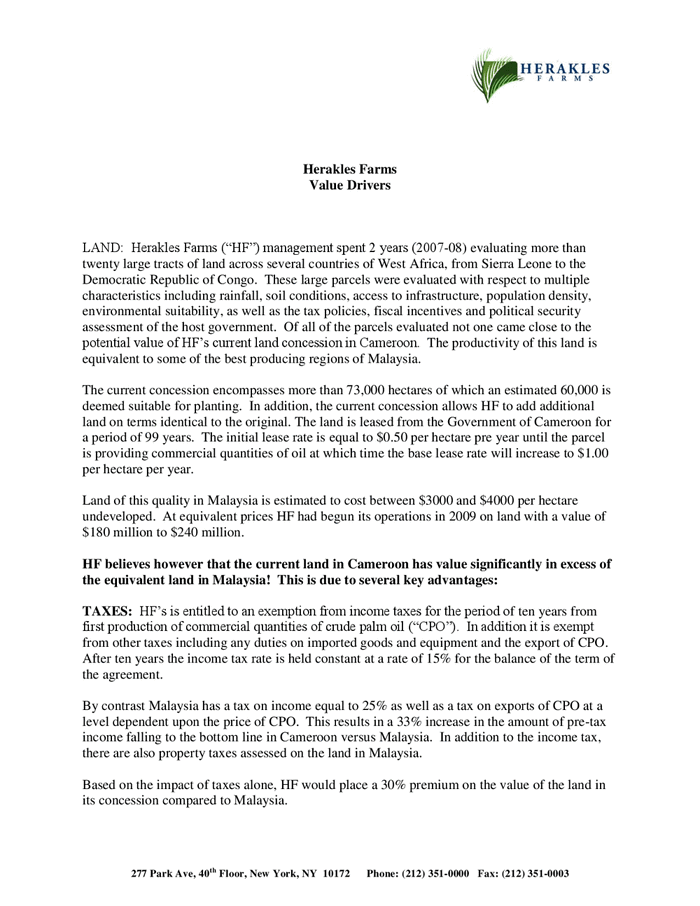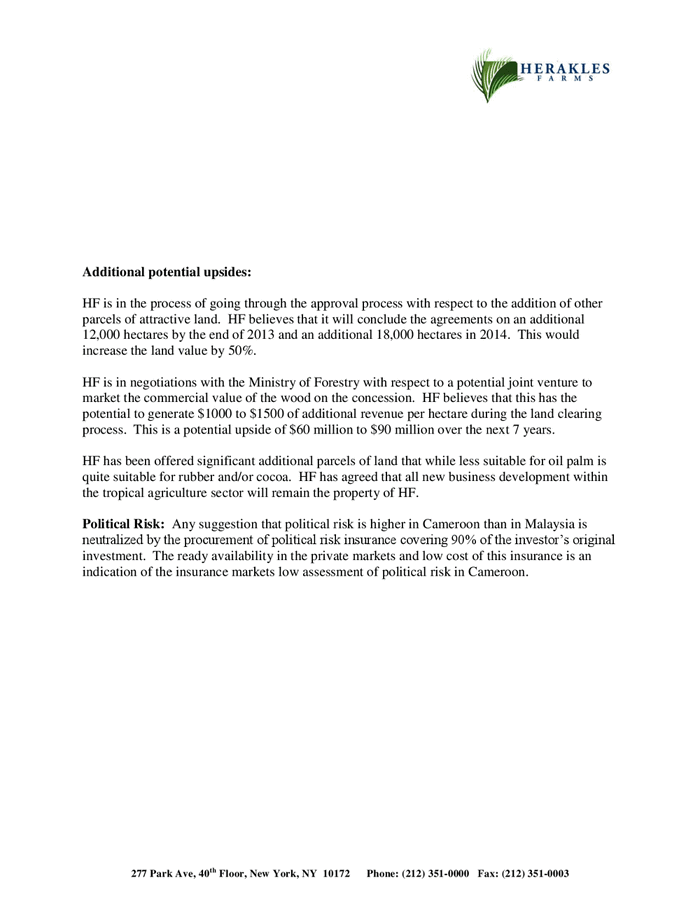Twin Faces in Land Deal
An affiliate of a New York-based venture capital firm has been forced to halt a major palm oil project in Cameroon, amidst charges of misleading investors and violating government agreements in the multi-million dollar land deal.
Herakles Farms, an affiliate of Herakles Capital, had told investors the company would earn millions of dollars by selling timber from land cleared to plant palm trees, according to a new report. That promise to investors contradicted earlier pledges the company made, under fire from environmentalists, that it would give the timber to Cameroon’s government, the report said.
The report, “Herakles Exposed: The Truth Behind Herakles Farms False Promises in Cameroon,” by the Oakland Institute and Greenpeace International, charges Herakles with widespread fraud, naming nine series of misstatements, lies or inaccuracies found in communications from the company about its sprawling 180,000-acre palm oil project in Cameroon.
The suspension “speaks to the evidence that this project is riddled with legal controversies,” said Anuradha Mittal, executive director of the Oakland Institute.
The charges against Herakles come at a time of rising foreign investments in land rights over much of Africa. Foreign governments and companies are buying land rights with terms running 25 to 100 years, often to produce food and biofuels. In the Democratic Republic of Congo, for example, a million-hectare deal is under discussion.
The suspension is the latest hurdle for the embattled project, one of the largest planned palm oil operations in Cameroon. The project being watched closely by investors, environmental groups, transparency advocates and governments across Africa.
Environmental groups and local citizens have accused the company of uprooting communities, short-changing the nation, and bribery. The company’s initial price per hectare in Cameroon, at 50 cents per year, is far below market value. Rights to develop similar land in Malaysia, the company pointed out in a note to investors, sell for $3,000 to $4,000 a hectare.
The deal covers 73,000 hectares, meaning the company would have paid $36,500.
Its lease agreement runs for 99 years.
In a statement, Herakles Farms announced that it “has suspended work in Cameroon in response to an order it received from the Government of Cameroon’s Ministry of Forestry and Wildlife.” Resumption of work, the statement said, was “subject to a declaration of public usefulness” in the zone where the company operates.
The order to freeze operations comes at a critical moment, as the company prepares to transfer saplings from the nurseries to their permanent places.
The company did not respond to questions about the new report.
Citing documents collected from company officials and employees, the report said that contrary to public claims by Herakles CEO Bruce Wrobel, the project has not secured all required government permits and approvals. It alleges that cash bribes and other rewards have been offered by the company to community leaders for access to land at negligible cost.
The report also cites a pattern of inconsistencies between what Herakles says it will do publicly and its position in internal company communications and notes to investors.
Data Herakles presented to investors, for example, show the company plans to harvest 24 tons of fruit per hectare (about 2.5 acres) seven years after planting, far above local norms and the 14.5 tons per hectare estimated by a London-based corporate research firm, Hardman and Company.
In another turnabout, Herakles’ Wrobel told investors in an open letter last September that any timber sales resulting from clearing the land for the project would benefit the government of Cameroon, and not the company.
But a recent “investment opportunity advisory” the company issued contradicts that pledge. In it, the company tells investors it will earn $60 to $90 million by selling the cleared timber during the project’s initial phase.
The report further alleges that:
- Herakles Farms is in dire financial straits, according to employee emails obtained by the environmental groups, and may need to change its operational methods, especially regarding land clearing.
- Herakles has routinely failed to follow national laws and regulations, resulting in several court cases.
- the company has engaged in intimidation and bribery, which could violate the terms of its political risk insurance. The coverage can be rendered invalid by coercive practices, according to a recent report by the Munden Project on financial risk in the agricultural sector.
- Herakles has not cleared the amount of land needed to plant 1.5 million seedlings from existing nurseries. Many of the seedlings are now overgrown.
Herakles Farms has marketed its plantation as a development project. But in a “value drivers” document to investors, the report notes, the company states that it is looking to make huge profits upon exit through IPO or acquisition, potentially as soon as 2017.
The environmental groups based the report on a review of internal emails, corporate communications to different audiences and interviews with local communities in Cameroon.
Last August, the company withdrew its application to the Roundtable on Sustainable Palm Oil (RSPO), an international group that sets standards for palm oil production.
At the time, Wrobel said his company would establish its own standards. Environmental groups and several academics criticized the company’s unwillingness–or inability–to meet Roundtable standards. The groups expressed concern that other companies might follow Herakles’s lead and ignore the Roundtable process.
The problem now is rule of law, said Sam Nguiffo, director for the Center for Environment and Development in Cameroon. In the absence of a national land plan, Nguiffo said, investors are directly competing with communities for access to land and resources.
Although Cameroon has ratified international treaties that require investors and the government to get community consent prior to a project, in reality those practices are not followed. “We don’t have in place the legislation to manage an investment of this complexity and this magnitude,” Nguiffo said.
Because Cameroon is a major new palm oil producer, Nguiffo added, Herakles’s actions there deal could set a precedent for the entire continent.


